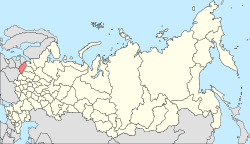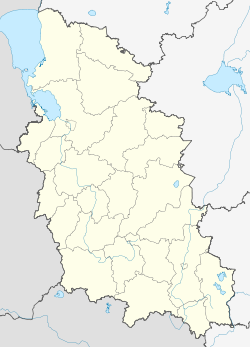Pytalovo
| Pytalovo (in English) Пыталово (Russian) |
|
|---|---|
| - Town - | |
 Location of Pskov Oblast in Russia |
|
|
|
|
|
|
|
|
|
|
| Administrative status (as of February 2013) | |
| Country | Russia |
| Federal subject | Pskov Oblast |
| Administrative district | Pytalovsky District |
| Administrative center of | Pytalovsky District |
| Municipal status (as of February 2013) | |
| Municipal district | Pytalovsky Municipal District |
| Urban settlement | Pytalovo Urban Settlement |
| Administrative center of | Pytalovsky Municipal District, Pytalovo Urban Settlement |
| Statistics | |
| Population (2010 Census) | 5,826 inhabitants |
| Time zone | MSK (UTC+03:00) |
| Known since | the end of the 18th century |
| Town status since | 1933 |
| Previous names |
Pytalovo or Novo-Dmitrovskoye (until 1925), Jaunlatgale (until 1938), Abrene (until 1945) |
| Postal code(s) | 181410 |
| Dialing code(s) | +7 81147 |
| on | |
Pytalovo (Russian: Пыта́лово; Latvian: Pitalova) is a town and the administrative center of Pytalovsky District in Pskov Oblast, Russia, located on the Utroya River (a tributary of the Velikaya), 102 kilometers (63 mi) southwest of Pskov, the administrative center of the oblast. Population: 5,826 (2010 Census);6,806 (2002 Census);7,166 (1989 Census).
Accounts of the origin of Pytalovo's name reflect the region's dichotomy. The unofficial Pytalovo website offers two possibilities for the origin of the town's name, neither based in any verifiable historical facts. One is that it was named for Lieutenant Pytalov, a guard to Catherine the Great, who received the lands in 1766 for reasons unknown, that estate subsequently being sold off by his descendants. The other is that the name "speaks for itself" (i.e., it is derived from the Russian verb "пытать", to torture), named for a church courtyard with a large iron cross used to torture and execute people.
A viable historical explanation is that Pytalovo is Russified Latvian for "Pietālava" (Latvian "pie Tālavas", or Latgalian "pī Tuolavas"), meaning "near Tālava", with Tālava being the name of an ancient Latvian feudal state. Russophones comprised the majority of the population in a number of parishes during Latvia's initial independence, with further Russification ongoing. Nevertheless, the older generation testified to their Latvian heritage. Historian Carl von Stern wrote of a cultural awakening amongst the region's inhabitants in the 1930s despite generations of Russification. Two thousand inhabitants from across Pskov gathered in September 1934 and proclaimed: "We are not Russian, but, indeed, Latvian. We are returning to our Latvian heritage. Latvians, lend us your helping hand, support and hasten our return!" Audiences wept as they heard old familiar folk songs sung with words and a language lost over time. A more concrete testament to Pytalovo's Latvian heritage is that the Latvian folk costumes of the region are the only ones which still preserve the most ancient tradition of white dress, once used in both daily life and for festive occasions.
...
Wikipedia


